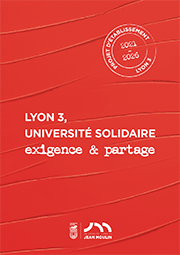AccueilRechercheProgrammes et productions scientifiquesThèsesThèses soutenuesThèses soutenues - 2006-2021Thèses soutenues - 2013
-
Partager cette page
- Recherche,
KWEON Sun Young
Vers un mandat d'arrêt international. Du contexte à sa mise en oeuvre.
Thèse en Droit pénal et sciences criminelles soutenue le 12 septembre 2013.
La société contemporaine est souvent qualifiée de ? village mondial ? et de ? société informatique ?. Cela signifie que le monde constitue désormais une communauté internationale aux frontières ouvertes, dans laquelle la coopération inter-étatique est élargie à tous les domaines, non seulement politique et militaire mais aussi économique et social, au point qu’aucun ?tat ne pourrait survivre en se repliant sur lui-même. La globalisation rend possible l’augmentation rapide des ressources en hommes et en matériels dont tire partie l’économie, économie licite mais aussi illicite, et finalement, le crime organisé a lui aussi globalisé ses propres activités. Qu’elle soit décriée ou applaudie, la globalisation de notre planète est à l’origine de bouleversements profonds, dont certains ne sont pas sans incidence sur la criminalité à l’échelle mondiale.
Pour faire face à cette criminalité mondialisée recourant à toute la panoplie de la technologie la plus moderne, une décision répressive rendue dans un ?tat ne peut être vraiment efficace que si les autres ?tats acceptent de lui donner effet sur leur territoire. En l’absence de cette solidarité, l’?tat encourt le risque de devenir le pays de destination de tous les délinquants cherchant à échapper aux décisions pénales, ce qui n’est évidemment pas souhaitable pour son image et son propre ordre public. Malgré d’innombrables difficultés, tout ?tat s’efforce de prévenir des crimes susceptibles d’avoir lieu au sein de son territoire et de sanctionner les criminels en cas d’infraction.
Le mandat d’arrêt est l’acte pris lors d’une enquête ou d’une instruction consistant à demander aux forces de police de rechercher la personne à l’encontre de laquelle il est émis, afin de la conduire devant le juge après l’avoir, le cas échéant, conduite à la maison d’arrêt. Cependant, la fuite à l’étranger du criminel peut rendre impossible la tenue du procès et l’exécution du mandat, et il existe un risque que celui-ci ne soit jamais condamné.
Si le criminel échappe à l’autorité de l’?tat et trouve l’abri à l’étranger, l’?tat rend possible l’arrestation par l’extradition, dans le cadre d’une coopération avec d’autres ?tats. Mais, les procédures prévues à cet égard sont trop complexes et requièrent surtout un temps très long. Plus la sanction des criminels prend du retard, plus il devient difficile d’accomplir la justice civile. Le premier pas de ce travail de recherche a été alors la question de savoir comment on pourrait accomplir cette justice de manière juste et rapide.
Une série d’autres interrogations a fait écho à cette question initiale. D’abord, elle nous a amenés à réfléchir sur un possible changement de l’autorité chargée de rechercher les criminels. Plut?t que d’assigner cette t?che seulement à l’?tat concerné, ne serait-il pas plus efficace de la faire partager entre plusieurs ?tats, voire même par l’ensemble d’?tats regroupés dans une organisation internationale ? Cette coopération internationale aura incontestablement un effet dissuasif chez les criminels qui sauront que s’enfuir à l’étranger ne leur permettra aussi facilement qu’avant d’échapper à la justice. Si cette idée para?t bien trop idéaliste, elle n’est pas pour autant dépourvue de tout réalisme. Certes, est-il trop rapide d’imaginer un tel système sans avoir étudié au préalable les différents systèmes mis en place par les ?tats au niveau national, interétatique et régional pour arrêter les criminels fugitifs et assurer le respect du droit.
? ce titre, le système du mandat d’arrêt européen a retenu plus particulièrement notre attention en nous amenant à nous interroger s’il ne s’agirait pas là d’un modèle pour le mandat d’arrêt au niveau international. ? la suite des attentats ayant frappé les ?tats-Unis le 11 Septembre 2001, l’Union Européenne a ainsi manifesté sa solidarité avec les ?tats-Unis en signant la Coalition Internationale contre le Terrorisme. Elle a en même temps décidé de se doter pour elle-même de nouveaux instruments d’action, au nombre desquels figure le mandat d’arrêt européen, créé par la décision cadre du Conseil européen de 2002. L’objectif de la création du mandat d’arrêt européen était de remplacer la procédure d’extradition en vigueur par un simple transfert des personnes poursuivies ou recherchées entre les autorités judiciaires des ?tats membres de l’Union.
Ainsi se pose tout naturellement la question de l’autorité d’émission de ce ? mandat d’arret international ?. Les organisations de justice internationales les plus adéquates pour ce dernier semblent les tribunaux pénaux internationaux ou la Cour pénale internationale. Pourrait-on en faire des centres du système de mandat d’arrêt international ? La réalité et l’état actuel de ces institutions ne permettent malheureusement pas d’y répondre immédiatement par l’affirmative.
C’est pour cette raison que la dernière question portant sur le sujet du mandat d’arrêt international s’intéresse aux notices rouges d’INTERPOL. En effet, il est moins audacieux et surtout plus réaliste de partir des actes déjà existants tels que les notices rouges pour concevoir un acte de droit international équivalent au mandat d’arrêt classique d’un ?tat. Si ces notices peuvent être considérées comme de véritables mandats d’arrêt, l’arrestation des criminels n’en sera rendue que plus fluide, compte tenu du point fort d’INTERPOL qui permet la connexion de 190 ?tats membres 24 heures sur 24 pendant toute l’année. Néanmoins, la diversité des types d’actes permettant de procéder à une arrestation provisoire ou encore la différence de la valeur accordée à ces notices d’un ?tat membre à l’autre, lancent inévitablement un défi pour surmonter ces obstacles. L’objet de la présente thèse est donc d’étudier précisément dans quelle mesure les notices rouges d’INTERPOL, à l’image des mandats d’arrêt européens en Europe, pourraient jouer le r?le dans le monde de véritables mandats d’arrêts internationaux. La notice rouge permet de renforcer l’efficacité de la justice nationale car c’est un outil supplémentaire pour lutter contre le crime international qui a un impact non négligeable sur la criminalité nationale. Or l’une des conditions à la publication de la notice rouge est l’existence d’un mandat d’arrêt national. Lorsque les conditions sont remplies, la notice rouge a pour effet de permettre de diffuser le mandat d’arrêt en question à l’échelle internationale.
Cependant, à l’heure actuelle, le cadre juridique sur lequel reposent les notices d’INTERPOL est assez flou. Persiste toujours un obstacle à la reconnaissance de la valeur légale aux notices rouges. En effet, si un pays n’a pas accepté et confirmé la valeur juridique des notices rouges dans son système pénal, et s’il n’a pas ratifié une convention qui mentionne les notices rouges d’INTERPOL, la notice rouge émise sera examinée sur la base du ? cas par cas ?, en fonction de l’intérêt du pays requis. C’est la raison pour laquelle davantage d’efforts sont nécessaires pour faire des notices rouges un véritable instrument vecteur de coopération voire même d’une certaine intégration internationale en matière d’arrestation et d’extradition des délinquants.
Dans le futur, si le pouvoir des notices devait être renforcé, il faudra définir un cadre juridique précis et prendre en compte certaines conditions sur le modèle du mandat européen. ? cet égard, une étape essentielle de ce processus sera l’établissement d’un minimum de normes communes quant aux garanties procédurales accordées aux personnes suspectes ou accusées d’avoir commis une infraction pénale dans tous les ?tats membres. Pour renforcer l’autorité des notices rouges à l’égard de toutes les personnes concernées, il serait effectivement souhaitable de garantir les droits de ces personnes, quel que soit l’?tat dans lequel elles se trouvent.
Contemporary society is often called “global village" and “information society”. This means that the world is now an international community with open borders, in which the inter-state cooperation is extended to all areas, not only political and military but also economic and social, to the point that no State could survive by folding in on itself. Globalization makes possible the rapid increase of resources in men and material which takes advantage of the economy, licit economy but also illegal, and finally, organized crime has also globalizing its own operations. Whether criticized or applauded, the globalization of our planet is causing profound changes, some of which are not without impact on crime in the world.
To encounter this global crime using the full panoply of modern technology, a repressive decision rendered in a State would not be truly effective only if other states agree to implement it in their territory. Without this solidarity, the State runs the risk of becoming the destination of all offenders seeking to escape the criminal decisions, which is obviously not desirable for its image and its own public policy. Despite numerous difficulties, any State strives to prevent crimes that may occur within its territory and punish criminals for violations.
The arrest warrant is an act done in an investigation or an instruction to ask the police to search the person against whom it is issued, in order to take the person in front of the judge after having arrested him, if necessary, and to lead him to the prison. However, the escape abroad of the criminal may preclude the trial and execution of the warrant, and there would be a risk that it will never be condemned.
If the criminal escapes from the State and finds a shelter in a foreign Country, the state makes it possible to arrest him by the system of extradition, in cooperation with other States. However, the procedures in this regard are too complex and require a very long time. More punishment of criminals is delayed; the harder it becomes to perform the justice. The first step of this research was the question of how we could accomplish this justice in a fair and rapid manner.
A series of other questions echoed that initial question. First, it led us to think about a possible change of the authority in charge of searching criminals. Rather than assign the task only to the State concerned, would it be much better to share it among several States, or even by all States together within an international organization? This kind of international cooperation will certainly have a deterrent effect on criminals who may flee to the foreign Country easily with the purpose to escape from the justice. If this idea seems too idealistic, it does not mean devoid of any realism. Certainly, it would be too quick to imagine such a system without having previously studied the various systems implemented by States at the national, inter-state or regional level so as to arrest fugitive criminals and to ensure compliance with the law.
As such, the system of the European arrest warrant has engaged our attention in particular and brought us to ask ourselves if there would not be a model for the arrest warrant at the international level. Following the attacks suffered by the United States September 11, 2001, the EU has expressed its solidarity with the United States by signing the International Coalition against Terrorism. It has simultaneously decided to create for itself new instruments, among which is the European arrest warrant, created by the European Council Framework Decision of 2002. The objective of the creation of the European arrest warrant was to replace the existing extradition procedure by a simple transfer of persons prosecuted or sought by judicial authorities of the Member States of the Union.
So naturally comes up the question of the issuing authority of this “international arrest warrant”. International organizations of justice are best suited to international criminal courts or the International Criminal Court. Could we make them bases of system international arrest warrant? Reality and the current status of these institutions unfortunately do not respond immediately to the affirmative.
This is why the last question on the subject of international arrest warrant is interested in INTERPOL Red Notices. Indeed, it is less bold and above all more realistic from the existing acts such as Red Notices to design an act of international law equivalent to the classical arrest warrants of a State. If these notices can be considered as veritable arrest warrants, arrest criminals will be made more fluid, given the strong point of INTERPOL which allows connection of 190 member States 24 hours over 24 throughout the year.
Nevertheless, the diversity of types of acts permit to proceed a provisional arrest or the difference of the value in accord with these notices by one member State to another, inevitably throw a challenge to overcome these obstacles. The purpose of this thesis is to study precisely how INTERPOL Red Notices, with the image of European arrest warrants in Europe, could play the role as a veritable international arrest warrants in the world. The Red Notice permits to enhance the effectiveness of national justice because it can be an additional tactic in the fight against international crimes which has a significant impact on crimes in a State. And one of the conditions to issue a Red Notice is the presence of a national arrest warrant. Once the conditions are met, the Red Notice has the effect of allowing distributing the arrest warrant in question internationally.
However, currently, the legal framework upon which INTERPOL Notices is not so clear. Still remains an obstacle to recognize the legal value of the Red Notices. Indeed, if a Country has not accepted and confirmed the legal value of Red Notices in its criminal justice system, and if it has not ratified a convention that mentions the Red Notice of INTERPOL, any issued Red Notice will be treated based on “case by case”, according to the national interest of the requested Country. This is the reason why more efforts are needed to make Red Notices as a veritable instrument vector of cooperation and even some international integration in the field of arrest as well as the extradition system of offenders.
In the future, if the legal value of Notices must be strengthened, it will be indispensable to set a clear legal framework and to take account of certain conditions on the model of the European arrest warrant. In this regard, an essential step in this process is the establishment of minimum common standards as the procedural guarantees in accord with the suspected or the accused that have committed a criminal offense in all member Countries. To strengthen the legal value of Red Notices in respect of all concerned persons, it would indeed be desirable to guarantee the human rights, regardless of any State where they are.
Mots-clés : Mandat d’arrêt, INTERPOL, Mandat d’arrêt international, Mandat d’arrêt européen, Notice rouge, Système de l'extradition
Keywords : INTERPOL, Red notice, Arrest warrant, European arrest warrant, International arrest warrant, Extradition system
Directeur de thèse : André VARINARD
- Philippe BONFILS, Professeur, Université d’Aix Marseille
- Patrick MISTRETTA, Professeur, Université de Picardie
- Elisabeth JOLY-SIBUET, Ma?tre de conférences HDR, Université Jean Moulin Lyon 3
- Monsieur André VARINARD, Professeur émérite, Université Jean Moulin Lyon 3
Président du jury : MISTRETTA
Mention : Très honorable
Equipe d'accueil : Centre de droit pénal







